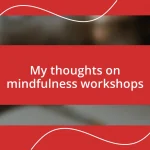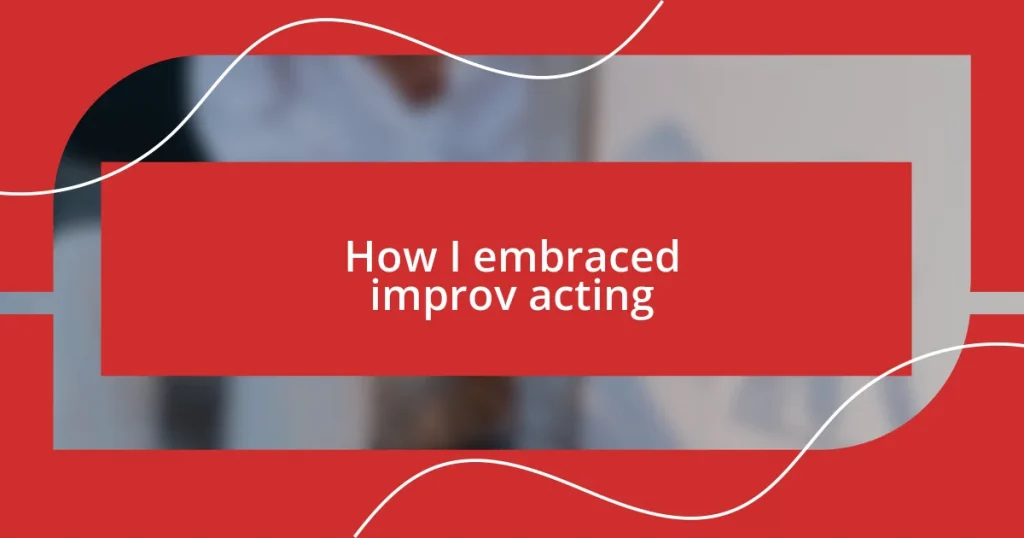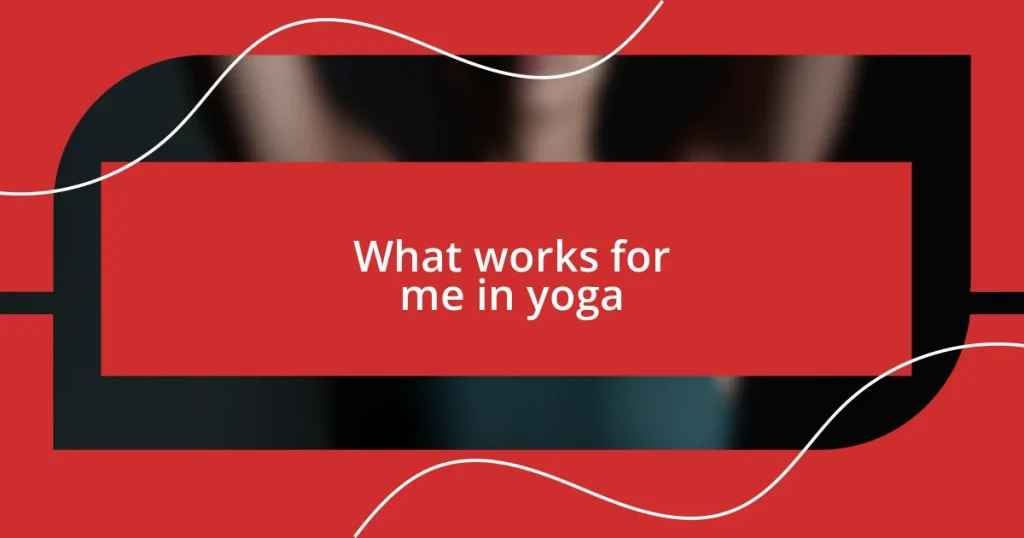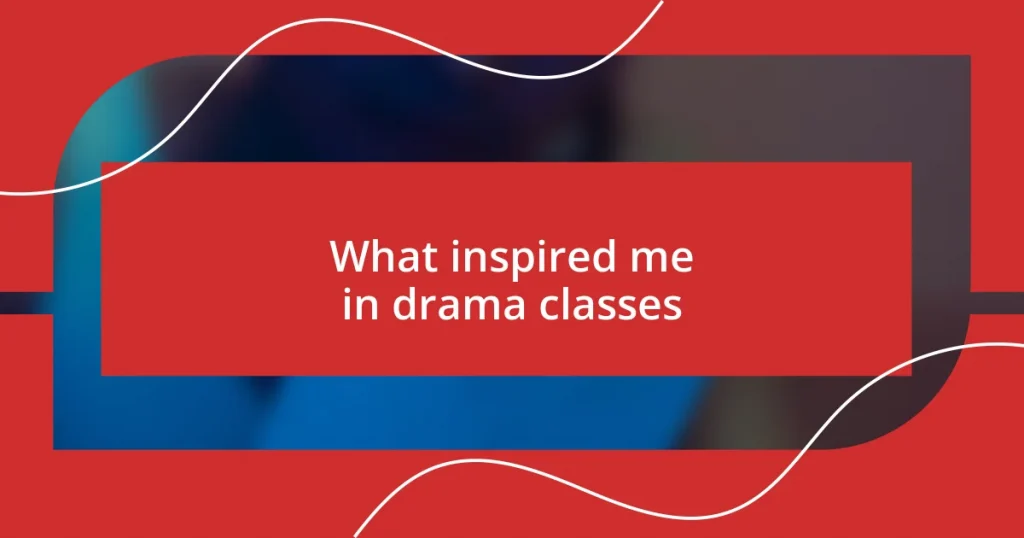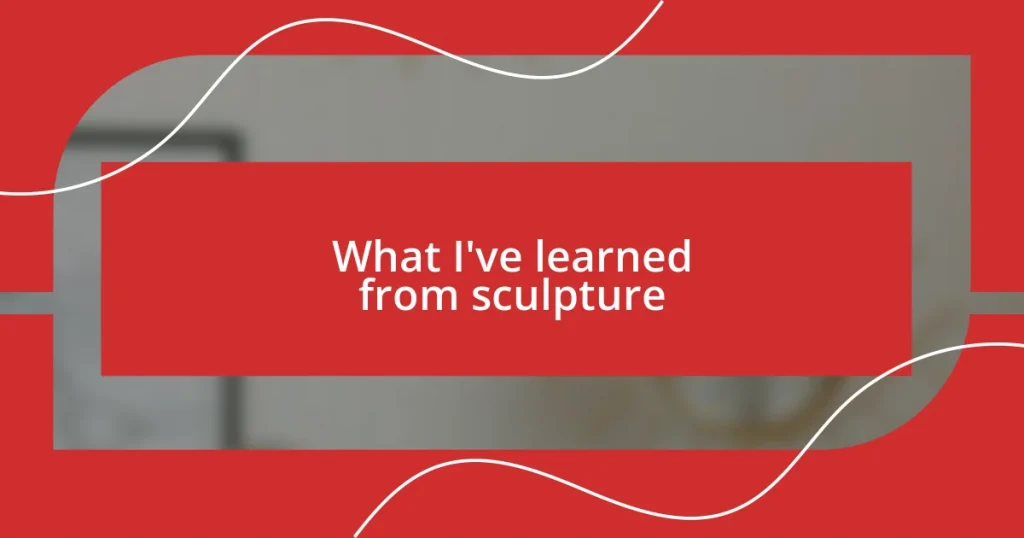Key takeaways:
- Choosing the right improv class is crucial; a supportive environment and teaching style can greatly enhance learning and confidence.
- Building confidence through practice transforms initial nerves into excitement and acceptance, emphasizing authenticity over perfectionism.
- Improv fosters adaptability and teamwork; embracing spontaneity and supporting each other strengthens collaboration and creativity.
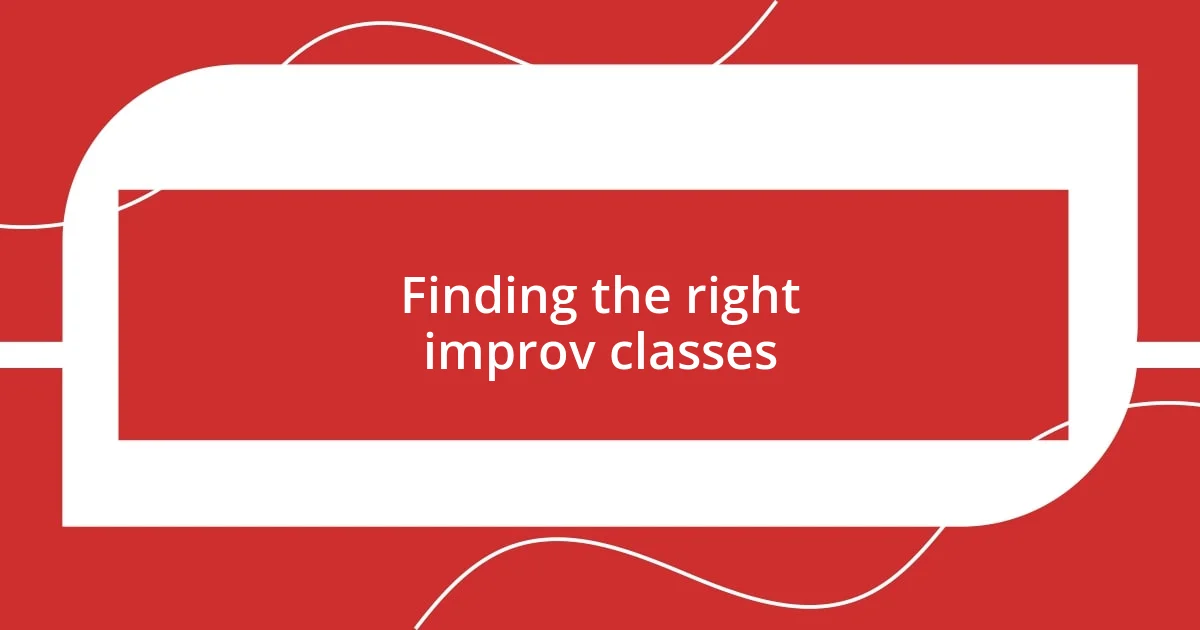
Finding the right improv classes
Finding the right improv class can feel overwhelming with so many options out there. When I started, I remember being intimidated by the myriad of offerings. How do you know which class will truly resonate with you? I suggest exploring local theaters, community centers, or online platforms that cater specifically to improv, as each can provide a unique flavor of instruction.
One of my first classes was a mix of seasoned actors and shy beginners. I didn’t know what to expect, but I quickly found that an encouraging environment made all the difference. Have you ever walked into a room and felt instantly at ease? It’s important to find a space where you feel safe to express yourself, take risks, and, yes, even fail without judgment.
As I navigated my journey, I realized the teaching style was just as crucial as the curriculum. Some instructors are heavily structured, while others adopt a more freeform approach. What’s your learning preference? I learned more from instructors who embraced spontaneity, pushing me beyond my comfort zone. Trust me, when you find the right class, it’s like unearthing a hidden gem—everything suddenly clicks, and you wonder why you didn’t start sooner.
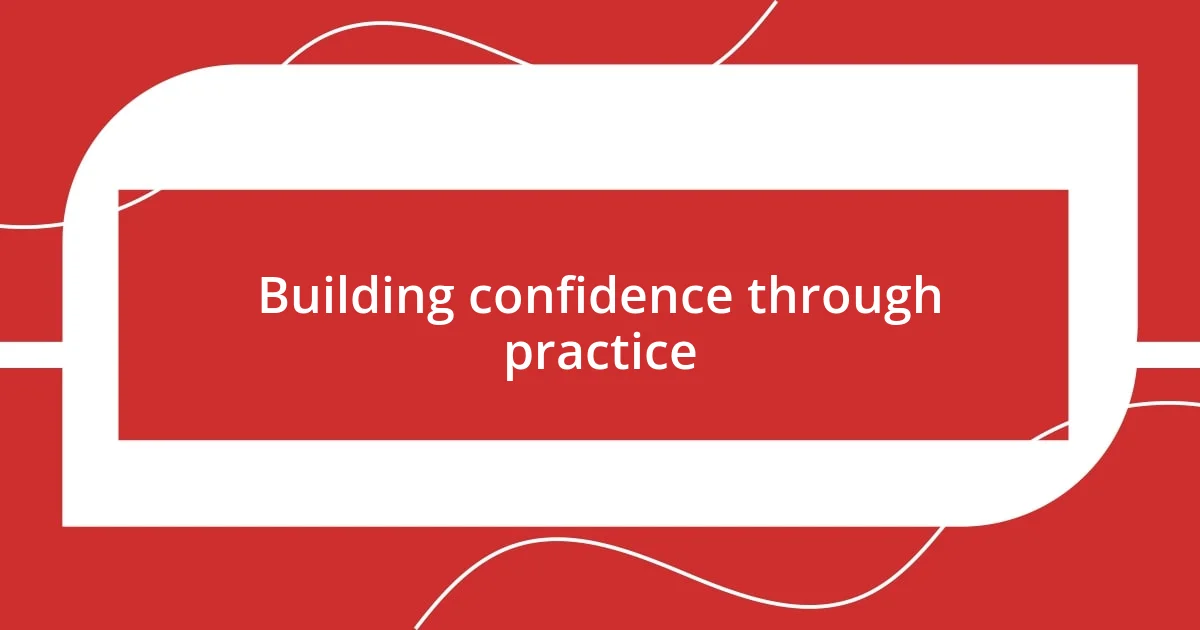
Building confidence through practice
Building confidence through practice is a gradual yet rewarding journey. I distinctly remember the first time I stepped on stage during an improv session. My hands were clammy, and my heart raced as I delivered the simplest line in a scene. To my surprise, the laughter that erupted from the audience felt electric! It was as if each giggle transferred a spark of assurance into my veins, altering my nervousness into a palpable sense of empowerment. Every performance after that became a stepping stone, reinforcing my confidence bit by bit.
Regular practice has a profound impact on self-assurance. I’ve noticed how, with every rehearsal and performance, my fear of judgment faded. Initially, I would spiral into self-doubt, worrying about forgetting lines or making a fool of myself. However, as I delved deeper into the art of improvisation, I began to embrace mistakes as learning opportunities. I vividly recall a moment when I tripped over my words during a scene; instead of panicking, I owned it, turning the slip into a hilarious running joke throughout the performance. This willingness to embrace my imperfections not only enhanced my acting skills but fortified my confidence.
One vital lesson I learned is that practice cultivates resilience. The more I immersed myself in improv, the more I recognized that confidence isn’t about being perfect—it’s about being authentic. After a few months of consistent practice, I found myself volunteering to lead scenes, a role I never envisioned taking on. There’s something incredibly liberating about pushing mental boundaries, which allows you to grow not just as an actor but as an individual. Have you ever felt that rush of bravery from simply giving something a shot? Practicing improv taught me that confidence isn’t a destination; it’s a continuous journey built through experience and willingness to step out of my comfort zone.
| Aspect | Effect of Practice |
|---|---|
| Initial Nerves | Transformed into Excitement |
| Fear of Judgment | Replaced with Acceptance |
| Perfectionism | Embracing Authenticity |
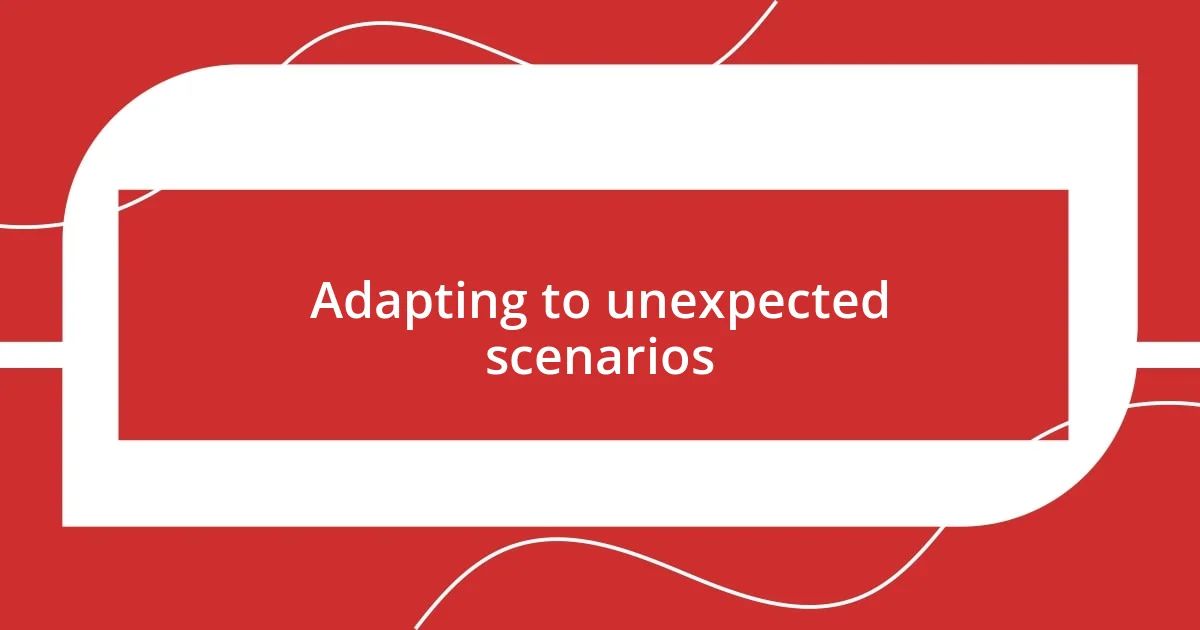
Adapting to unexpected scenarios
Adapting to unexpected scenarios is an essential skill in improv, and I’ve learned just how important it can be. There was a night during a performance when I completely blanked on my line. The audience was silent, and for a moment, panic set in. But instead of freezing, I quickly looked around and integrated an element from the set: a random prop. I improvised a backstory related to it, and the audience loved it! That experience taught me how quick thinking and creativity can turn a potentially awkward moment into something memorable.
When faced with the unknown, integrating spontaneity becomes a powerful tool. Here’s how I approach these scenarios:
- Stay Present: I remind myself to breathe and focus on the moment rather than my nerves. This helps me connect with my fellow performers and the audience.
- Embrace Mistakes: Instead of dreading errors, I’ve found joy in unpredictability. A slip-up might inspire a new direction in the scene.
- Be Resourceful: Utilizing props or elements around me turns unexpected situations into opportunities for humor or depth, enhancing the performance.
- Trust Your Instincts: Often, my best ideas arise instinctively in the heat of the moment. I’ve learned to trust that inner voice, which can lead to surprisingly engaging narratives.
It’s a dance of adaptability, where each twist leads to a new rhythm waiting to be explored.
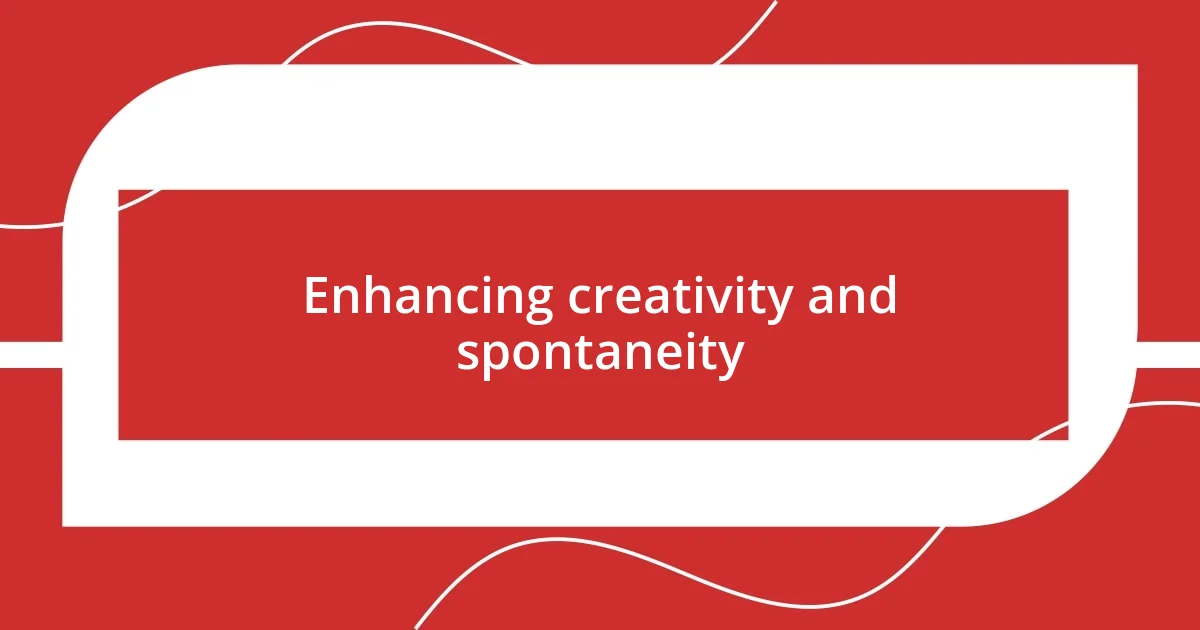
Enhancing creativity and spontaneity
Embracing improv has been a game-changer for my creativity. I remember one evening, while rehearsing, I had to create a character on the spot who was obsessed with spaghetti. It felt like a bizarre challenge at first, but I soon found myself weaving wild stories about spaghetti festivals and bizarre rituals. This playful exercise ignited a spark in my mind, enabling me to approach everyday situations with fresh perspectives. Have you ever tried to look at a mundane task in a new light? Those simple acts of improvisation expand not just my acting range but my creative thinking beyond the stage.
The spontaneity required in improv encourages a mindset shift that thrives on unpredictability. In one scene, we were supposed to navigate a serious conflict, but when my scene partner unexpectedly slipped on a banana peel (yes, a classic), it threw us into uncontrollable laughter. Instead of steering back to seriousness, we embraced the chaos. It transformed our performance into a delightful mix of humor and sincerity, showcasing that spontaneity can lead to extraordinary moments. I’ve discovered that, by surrendering to the unexpected, creativity flourishes in ways I never anticipated.
With improv, I’ve come to understand the vital role of collaboration in creativity. Many times, my ideas have taken flight only because my fellow actors were willing to build off of my wild notions. One memorable scene revolved around a grocery store heist, all sparked by my partner’s hilarious suggestion of stealing a mystery fruit. As we spun the narrative together, the spontaneity created a collective energy that made our performance unforgettable. It’s in these shared creative moments that I find a profound connection to others, showcasing how collaboration can enhance my spontaneity and creativity immensely.
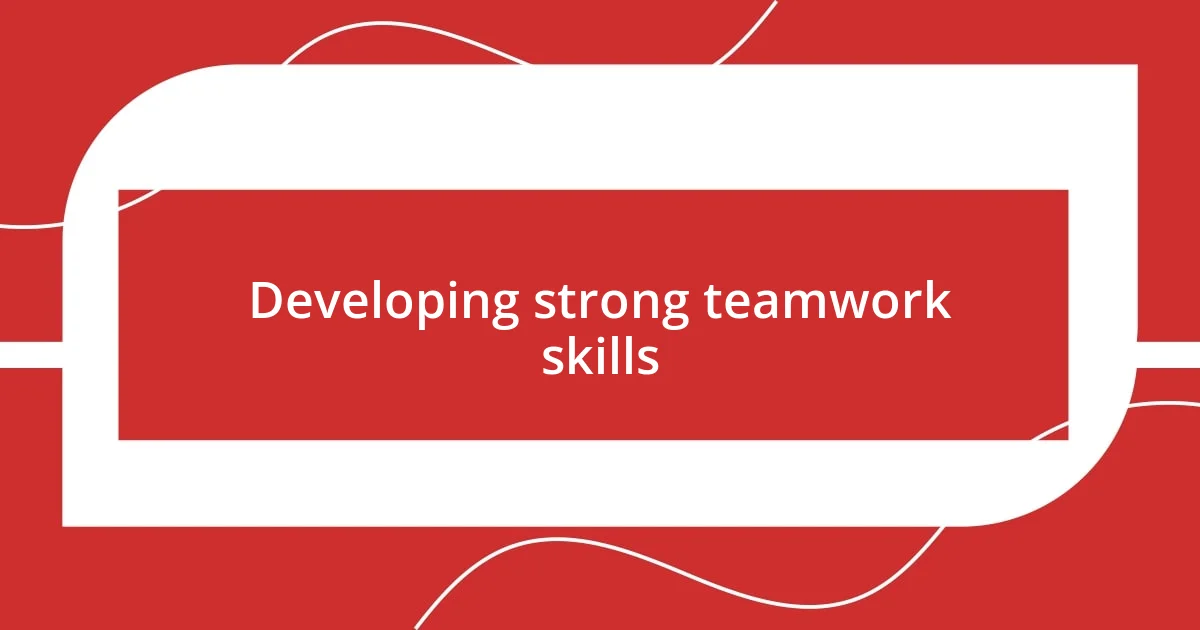
Developing strong teamwork skills
It’s fascinating how improv has shaped my understanding of teamwork. In one memorable practice session, we worked on ensemble scenes where every actor had to listen actively and respond naturally. I remember feeling a surge of excitement as we tossed ideas back and forth, each one building upon the last. The way we supported each other, trusting that every contribution had value, made me realize how essential synergy is to any collaborative effort. How many times have you seen a project thrive just because the team gelled together?
One day, we faced a particularly challenging scene that required empathy and quick adjustments. As my partner stumbled over a line, I immediately jumped in to support her character, creating continuity even in her moment of hesitation. It felt exhilarating to be part of that flow; it sharpened my instincts and tightened our connection as a team. This experience underscored a powerful lesson: teamwork isn’t just about executing ideas but also about being there for each other, lifting one another up when the pressure is on.
In another experience, we experimented with various roles in which we took turns leading and following. This dynamic taught me that great teamwork involves flexibility—the ability to let go of the spotlight when needed. I recall stepping back during a scene, allowing a quieter cast member to shine, and witnessing her breakthroughs filled me with immense pride. Have you ever felt that satisfaction when others succeed through your support? It’s that kind of shared victory that deepens bonds and makes working together not just effective but truly fulfilling.









